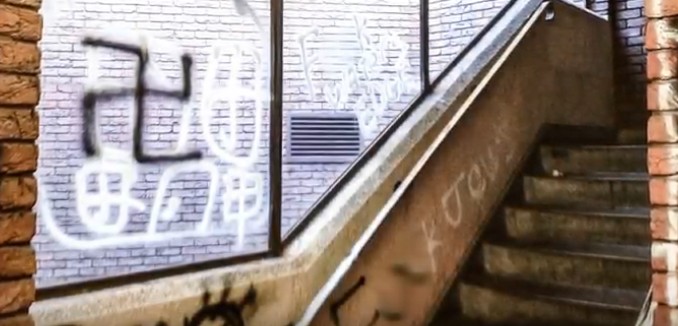
The Community Security Trust recorded 892 anti-Semitic incidents nationwide in the first six months of 2019, the highest number recorded in a January to June period and a 10% increase on 2018, itself a record high.
A further 270 reports of potential incidents were received by CST in the first six months of 2019 but were not deemed anti-Semitic. These involved suspicious activity or hostile reconnaissance at Jewish locations, criminal activity affecting Jewish people and buildings, and anti-Israel activity.
CST recorded over 100 anti-Semitic incidents each month, the third consecutive year this has occurred.
Some 323 incidents involved social media, an increase of 46 per cent over the past 12 months.
But totals understate the scale of the problem.
Targeted campaigns directed at individual victims often involve dozens of social media accounts sending hundreds or even thousands of tweets, images or posts within a concentrated timespan, but each campaign of this type is only recorded by CST as a single incident.
Incidents involving social media are recorded by CST if they have been reported to CST by either the victim or a witness, if the content shows evidence of anti-Semitic language, motivation or targeting, and if the offender is based in the United Kingdom or has directly targeted a UK-based victim.
The highest monthly totals were February and March, 182 and 169 incidents respectively.
These were the joint-fourth and sixth highest monthly totals ever recorded by CST. They occurred when issues relating to Jews and anti-Semitism were prominent in news and politics due to the continuing controversy over antisemitism in the Labour Party.
February saw several MPs leave the Labour Party, some of whom cited anti-Semitism as a prominent reason for their decision.
There was a 37 per cent increase in violent anti-Semitic assaults. None were classified as ‘Extreme Violence’, meaning grievous bodily harm or a threat to life.
There were incidents of damage and desecration of Jewish property, abusive behaviour, including verbal abuse, anti-Semitic graffiti, anti-Semitic abuse via social media and one-off cases of hate mail, direct anti-Semitic threats and cases of mass-mailed anti-Semitic leaflets or emails.
Almost two thirds of incidents were recorded in Greater London and Greater Manchester, 453 and 123 respectively. Both figures were a fall of one per cent on 2018.
In contrast, CST recorded an increase in anti-Semitic incidents outside the two largest Jewish communal hubs, 316 this year including 43 incidents in Hertfordshire, 34 in Merseyside, 18 in Gateshead, 15 in Leeds, 12 in Birmingham and 11 in Wales.
This increase is probably a consequence of online incidents recorded by CST and ongoing efforts to improve incident reporting with Police forces around the UK. CST has had a national information sharing agreement with the National Police Chiefs’ Council since 2015.
“The problem is spreading across the country and online, it reflects deepening divisions in our society and it is causing increasing anxiety in the Jewish community,” said CST chief executive David Delew.
“It will take people of all communities and backgrounds standing together to turn this tide of hate around.”
Assistant Chief Constable Mark Hamilton, National Police Chiefs’ Council Lead for Hate Crime, values the work of CST in protecting communities.
“It can never be acceptable to abuse someone because of their ethnicity or religion, but we see that there are still far too many in our society who are prepared to act illegally, fuelled by global events, divisions in our own society or by bigoted ideologies,” he commented. “The police will continue to improve our services to victims and to help bring offenders to justice.”
The police chief added, “It is always concerning to see indicators of increased hate crime, unless we are confident that they reflect better reporting or recording. We will be working with analysts when the national crime data is released in autumn, to establish whether these increases reflect a greater incidence of hate crime or further improvements in reporting levels.
“Evidence from hate crime statistics and the national crime survey over the last decade suggest that more hate crime victims are willing to report crimes when they do occur. However, we cannot be complacent and a single crime is unacceptable. I would encourage every victim to report any hate crimes, either by contacting the police direct or through CST.”
CST has recorded anti-Semitic incidents since 1984.
By Adam Moses









